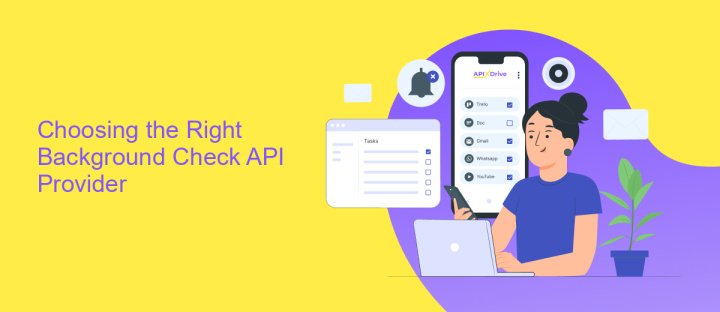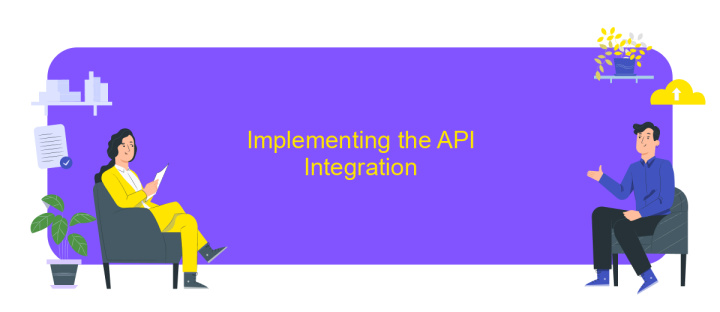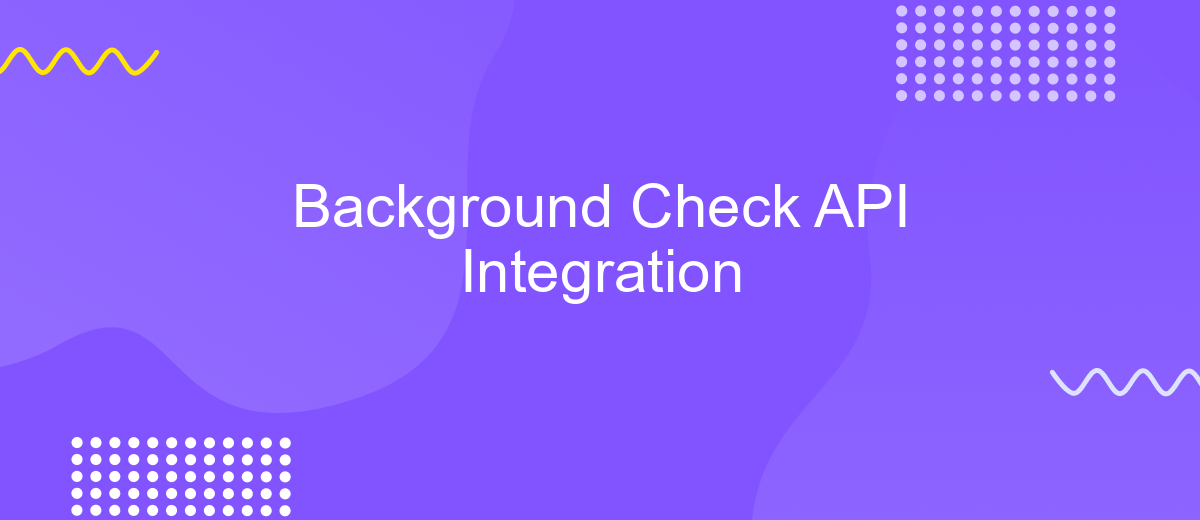Background Check API Integration
In today's fast-paced digital landscape, integrating a Background Check API into your systems is essential for ensuring security and making informed decisions. This seamless integration allows businesses to efficiently verify the credentials of potential employees, partners, or clients, thereby minimizing risks and enhancing trust. By automating the background check process, organizations can save time, reduce costs, and maintain compliance with industry standards.
Introduction to Background Check APIs
Background Check APIs have become an essential tool for organizations looking to streamline their hiring processes and ensure workplace safety. These APIs allow businesses to integrate background screening capabilities directly into their existing systems, providing a seamless and efficient way to verify the credentials and history of potential employees. With the increasing need for reliable and fast background checks, these APIs offer a technological solution that can save time and reduce manual errors.
- Automated data collection from multiple sources
- Real-time results and updates
- Customizable checks tailored to industry-specific needs
- Secure handling of sensitive information
- Compliance with legal and regulatory standards
By leveraging Background Check APIs, companies can enhance their decision-making processes and maintain a high level of security and trust within their workforce. This integration not only improves operational efficiency but also helps in building a transparent and reliable hiring framework. As businesses continue to evolve, the adoption of such technologies becomes crucial in staying competitive and ensuring a safe working environment.
Choosing the Right Background Check API Provider

When selecting a Background Check API provider, it's crucial to consider several factors to ensure you choose the right partner for your needs. First, evaluate the comprehensiveness and accuracy of the data provided. Reliable background checks should cover a wide range of information, including criminal records, employment history, and education verification. Additionally, consider the provider's compliance with relevant regulations, such as FCRA and GDPR, to ensure the protection of sensitive data and avoid legal issues.
Another important aspect is the ease of integration. Look for APIs that offer straightforward documentation and support to facilitate seamless integration into your existing systems. Services like ApiX-Drive can be invaluable in this regard, as they simplify the process of connecting APIs without the need for extensive coding knowledge. Finally, assess the provider's customer support and scalability options to ensure they can accommodate your business's growth and provide assistance when needed. By carefully considering these factors, you can select a Background Check API provider that aligns with your organization's needs and goals.
Implementing the API Integration

Integrating a Background Check API into your system can streamline your hiring process by automating candidate screening. To begin, ensure you have access to the API documentation provided by the service provider. This will guide you through the technical requirements and authentication methods necessary for integration.
- Register for an API key with the background check service provider, ensuring you have the necessary permissions for access.
- Set up your development environment by installing any required libraries or dependencies as specified in the API documentation.
- Implement the API endpoints in your application, focusing on key functionalities such as initiating background checks, retrieving results, and handling errors.
- Test the integration thoroughly in a sandbox environment to ensure all functionalities work as expected and handle any exceptions gracefully.
- Deploy the integrated solution to your production environment, ensuring secure data handling and compliance with relevant regulations.
Once integrated, monitor the API performance and maintain regular updates as provided by the service provider. This ensures that your system remains efficient and up-to-date with the latest features and security standards. Proper implementation will enhance your recruitment process, providing reliable and timely background check results.
Legal and Compliance Considerations

When integrating a Background Check API, it's crucial to consider the legal and compliance implications. Different jurisdictions have varying regulations regarding data privacy and background checks, so understanding these laws is essential to avoid potential legal issues.
Compliance with data protection laws, such as the GDPR in Europe or the CCPA in California, is mandatory. These regulations dictate how personal data should be collected, processed, and stored. Ensuring that your integration complies with these laws will not only protect your organization from legal penalties but also build trust with your users.
- Obtain explicit consent from users before conducting background checks.
- Ensure data security measures are in place to protect sensitive information.
- Regularly update your privacy policies to reflect any changes in legislation.
- Work with legal professionals to ensure full compliance with applicable laws.
Additionally, transparency with users about how their data will be used is vital. Providing clear and concise information about the background check process and data handling practices will help maintain user trust and ensure compliance with transparency requirements.
- Automate the work of an online store or landing
- Empower through integration
- Don't spend money on programmers and integrators
- Save time by automating routine tasks
Best Practices and Common Pitfalls
When integrating a Background Check API, it's crucial to follow best practices to ensure seamless functionality and data security. First, thoroughly understand the API documentation and its capabilities. This knowledge helps in crafting efficient queries and handling responses correctly. Utilize secure protocols like HTTPS to protect data in transit and implement robust authentication methods, such as API keys or OAuth. Regularly update your integration to accommodate API changes and leverage tools like ApiX-Drive for streamlined setup and management, ensuring minimal disruptions in service.
Avoid common pitfalls by not underestimating the importance of error handling. Implement comprehensive logging and monitoring to quickly identify and resolve issues. Ensure compliance with data protection regulations, such as GDPR, by anonymizing sensitive information where possible. Overlooking these aspects can lead to data breaches or service downtime. Additionally, avoid hardcoding API credentials within your application to prevent unauthorized access. Instead, store them securely using environment variables or a secrets manager. By adhering to these practices, you can achieve a reliable and secure API integration.
FAQ
What is a Background Check API Integration?
How do I integrate a Background Check API into my application?
What are the benefits of using a Background Check API Integration?
Are there any data privacy concerns with Background Check API Integration?
Can I customize the Background Check API Integration to fit my specific needs?
Time is the most valuable resource for business today. Almost half of it is wasted on routine tasks. Your employees are constantly forced to perform monotonous tasks that are difficult to classify as important and specialized. You can leave everything as it is by hiring additional employees, or you can automate most of the business processes using the ApiX-Drive online connector to get rid of unnecessary time and money expenses once and for all. The choice is yours!


